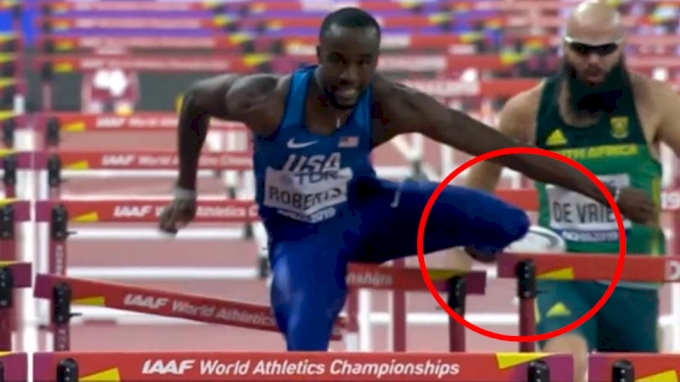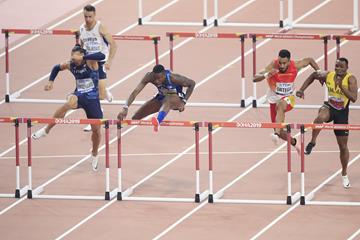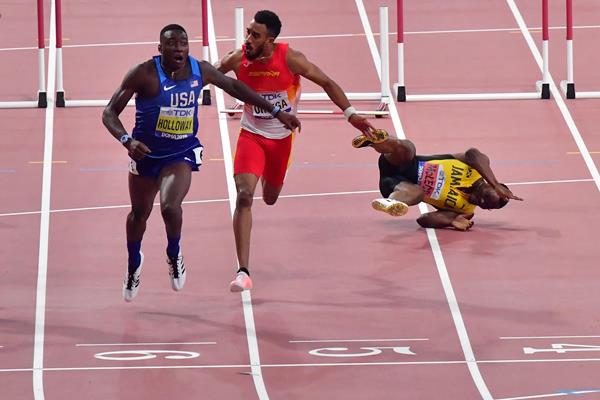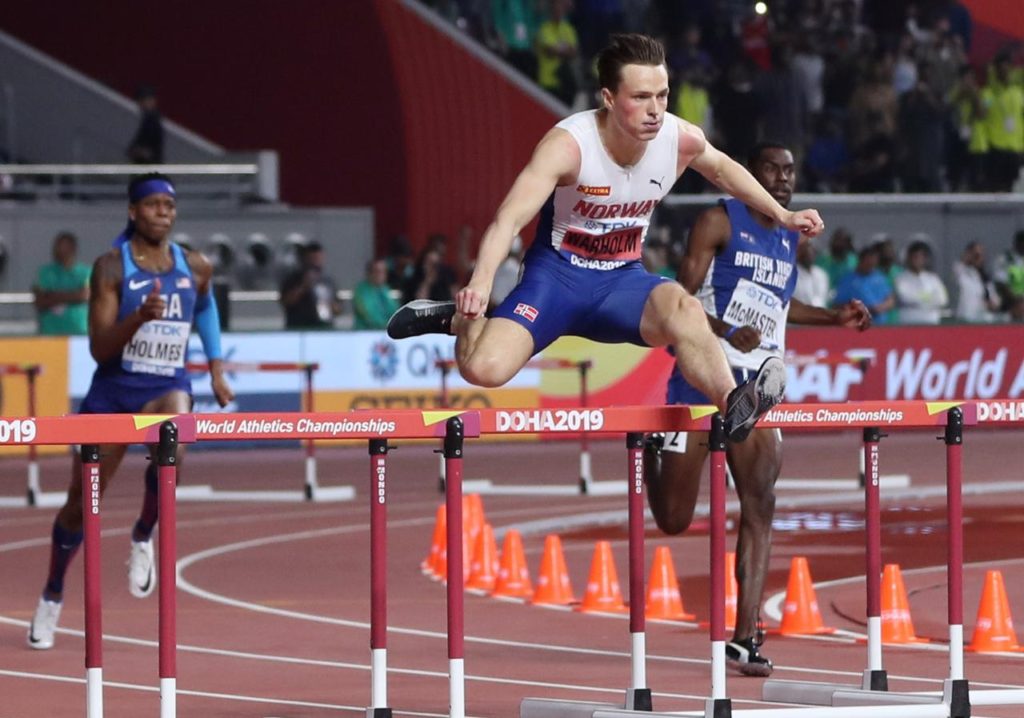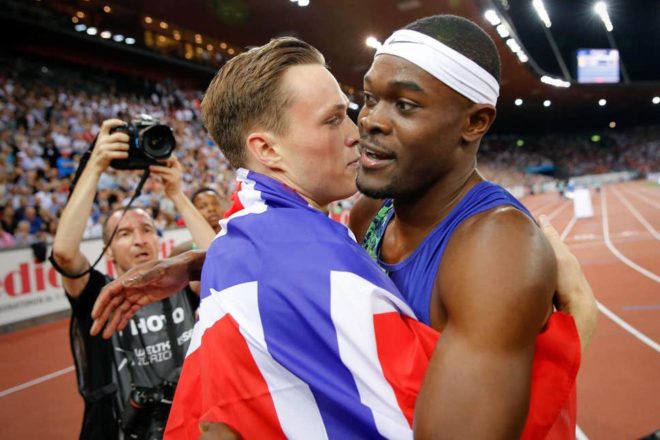A Look Back at the Men’s Hurdles at the 2019 World Championships
by Steve McGill
In last month’s issue, freelance writer Savannah Cress, wrote an article breaking down the women’s hurdling events at last month’s World Championships in Doha. So, as promised, I’m following up this month with an article on the men’s hurdling events. It was really a great meet for hurdling on both the women’s and men’s sides of the equation. For the men, the 400 meter hurdle race did not disappoint, as Norway’s Karsten Warholm and the United States’ Rai Benjamin dueled it out in the final, with the favorite, Warholm, dominating down the homestretch. In the 110 meter hurdles, there was much drama in the rounds and in the finals, as American Grant Holloway earned his way to the top of the podium.
[am4show not_have=’g5;’]
[/am4show][am4guest]
[/am4guest][am4show have=’g5;’]
Let’s start by talking about the 110’s first. The drama started early–in round one–when American Daniel Roberts was disqualified, despite winning the heat, for making contact with the hurdle in the adjacent lane. Roberts, who was running in lane four of the third preliminary heat, was cruising along for most of the race, although he did look a little shaky technique-wise. But that was nothing to be alarmed about, as it was natural to be a little nervous in the first round of his first World Championships. But the thing about hurdles is you can’t look around and relax like the best sprinters can in early rounds. You have to keep your rhythm. The foot of Roberts’ trail leg caught the edge of the crossbar of the hurdle in lane three, knocking the hurdle down, which meant the athlete in hurdle three, who hadn’t quite reached the hurdle yet, had nothing to clear once he got there. Now, obviously, Roberts contact with the adjacent hurdle had to lead to a disqualification, and it did. I was more than a bit surprised when TV analyst Ato Boldon said afterwards that the United States team would file a protest. How can you protest that? And of course, the team didn’t protest, because they knew they had a zero percent chance of winning a protest. You hit another dude’s hurdle, you’re gone. It’s pretty simple.
Now I’m gonna get on my soapbox here and tell you I told you so, although I didn’t literally tell you so. But I did say back in the indoor season that Roberts’ Aries-style lead arm was a problem that could get him into trouble because the arm was going across his body, and whenever the arm goes across the body, that flattens out the trail leg and causes it to be wider when clearing hurdles, instead of being high and tight. The reason the Aries arm worked so well for Aries in the peak of his career was because he kept it humming up and down and he kept the whole motion in a tight box, so to speak. Roberts hasn’t been doing that, so something like what happened at Worlds was destined to happen at some point. It’s a shame that it happened on such a big stage, where he certainly could’ve medaled, or even won. But hopefully it’ll lead to some refinements in his technique that will ultimately make him a better hurdler than he would’ve become if this disappointment had not occurred.
Through the prelims, all the big names that we were expecting to show up in a big way did show up. Orlando Ortega of Spain was looking very nice, as was Holloway, Jamaica’s Omar McLeod, France’s Pascal Martinot-Lagarde, and Sergei Shubenkhov (a man without a country). McLeod, who had had some excellent races as well as some downright tragic races throughout the season, was looking ready to rock and roll and reclaim his status as the world’s top hurdler. His 13.08 in the second semi-final heat was the fastest time in that round (and ended up being the fastest time in the meet), which made him the favorite heading into the finals. Holloway looked equally impressive in his semi-final race, cruising to a 13.10 victory. Lagarde, who was finally looking like a potential medalist after battling with sever injuries last year, ran a season’s best 13.12 behind McLeod in the second heat. Ortega won heat three easily in 13.16, and looked prime to claim the gold in the final for himself.
In the final, Holloway in lane six and McLeod in lane four were the first two out of the blocks, and together they established the early pace. By about the midway point of the race, it was clear that Holloway had control of the race as long as he could maintain his form. He, too, has had trail leg issues in the past, especially late in races. McLeod, meanwhile, was starting to hit hurdles, as he is wont to do when he doesn’t get out in front early. He’d had troubles with that earlier in the season, including a Diamond League meet in which he ended up veering into the next lane after hitting a hurdle and crashing into Shubenkhov as they were crossing the finish line.
Here, Holloway was able to maintain form and maintain rhythm, as he crossed the line in 13.10–matching his semi final time–and claimed his first gold medal in a major championship meet, despite having completed an extremely long season in which he’d been competing since way back in the indoor season, all the way through the collegiate outdoor season, and then throughout the entire summer. Pretty darn impressive.
Meanwhile, Ortega in lane five was closing on McLeod in the second half of the race, and Shubenkhov and Martinot-Lagarde were also looking good. McLeod smacked hurdle nine and stumbled off balance, then smacked hurdle ten and fell into Ortega’s lane, forcing Ortega to veer to the right to avoid contact. While McLeod ended up being disqualified for running out of his lane, Ortega, who most certainly would’ve medaled, and most likely would’ve finished second, ended up out of the medals as both Shubenkhov (13.15) and Martinot-Lagarde (13.18) passed him in the run-in off the last hurdle. Ortega ended up fifth, as China’s Xie Wenjun beat him by .01, 13.29 to 13.30. However, after a protest from Spain, Ortega was awarded a co-bronze medal, which was better than nothing, but had to be disappointing.
As an English teacher and writer, I can’t help but think that McLeod’s crash into Shubenkhov earlier in the year foreshadowed his stumble into Ortega’s lane here at Worlds. And honestly, it’s kind of annoying. If you’re in a race with McLeod, you know you don’t want to be in the lane to the immediate right of him, because he’s gonna end up in your lane sooner or later. Come on man. Clean up your race. Don’t ruin someone else’s race and someone else’s dream because you can’t stay in your lane. I know it wasn’t intentional and I’m not accusing him of anything. I’m just saying, stay in your lane. And if you gotta crash, fall forward. As a fan I’m disappointed because I’ll never know for sure if Ortega would’ve claimed the silver outright and I’ll never know what his time would’ve been. But that’s hurdles. Even at the highest levels.
***
Okay, on to the 400 hurdles. In this event, the talk in the buildup to the meet was centered around the fact that all three of the only three hurdlers in history–other than world record holder Kevin Young–to go under 47.00 in this event, were all gathered at the same meet for the first time in their careers. Norway’s Karsten Warholm, America’s Rai Benjamin, and Qatar’s Abderrahman Samba were all in Doha, ready to settle once and for all which of them is the world’s best.
Despite how even all three were on paper, however, Warholm came into the meet as the clearcut favorite. Ba hadn’t raced much prior to Worlds, as was assumedly dealing with injuries, and therefore hadn’t come close to matching his incredible 2018 season, when he was the one we were all expecting to become the dominant force in this event. So, even though his talents couldn’t be ignored, it seemed likely that he would come to Doha and leapfrog Warholm and Benjamin, both of whom had been having outstanding 2019 campaigns. Warholm had the best time heading into the meet, with a 46.92 that was good for the second-fastest time ever, behind only Young’s 1992 world record performance. In the same race, Benjamin also dipped under 47.00, with an almost equally mind-bogging 46.98.
Heading into the meet, it was looking like a sub-47 would be necessary to capture the gold. Many pundits felt that a world record might be necessary to do so. I wasn’t among those who felt that way, however, simply because of the fact that the rounds will take some pop out of the athletes’ legs, no matter how well-conditioned they are.
Unlike in the 110 race, where there were like six guys or arguably more who had a legit chance to medal, the consensus opinion in the 400h was that Warholm, Samba, and Benjamin would occupy the medal spots; it was just a matter of the order.
In the first round, all three got through with no problem, as Samba led the way time-wise with a 49.08 in the third heat. Warholm won the first heat in 49.27, and Benjamin won the fourth heat in 49.62. All three won their respective heat, and all three were able to conserve energy in doing so.
In the semis, Warholm led the way with a 48.28 in heat two. Benjamin and Ba both ran in heat three, with Benjamin winning in 48.52, and Samba second in 48.72, setting the stage for a dynamic final.
The final was actually a bit anticlimactic, to be honest, as Warholm took control of the race early (as he always does), and never was seriously threatened, although Benjamin managed to stay close the whole way. The man is a straight-up warrior, and that whole Viking routine he does reinforces it. It’s not just an act to get the crowd hyped; he really enters fully into that persona, and it fuels him in races. His winning time of 47.42 was disappointing only if he had spoiled us with those sub-47’s earlier in the year. 47.42 is still flying. Benjamin was also comfortably under 48.00, earning the silver in 47.66. Samba was definitely not his 2018 self, as he was not able to make magic happen in the final, running a relatively pedestrian time of 48.03 for the bronze over Jamaica’s Kyron McMaster, who ran his seasonal best of 48.10.
Looking ahead, it could be said that the 2019 World Championship final may well have served as a precursor to the 2020 Olympic final, as it seems very likely, barring injury, that Warholm, Benjamin, and Samba will still be at the top of the event, and will push each other to even greater heights. And because the Olympics will be in July instead of October, we won’t be seeing athletes who are already battle-weary from a long season.
[/am4show]
